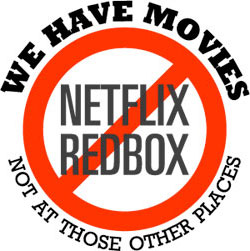Original movies: they don't make them like they used to
Posted Thursday, May 28, 2009 at 5:08 PM Central
by John Couture
Yesterday, I was reading a story online about the Tomb Raider remake/reboot and for some reason I was overcome yet again by the lack of creativity in Hollywood these days. Do we really need to revisit a movie less than a decade old based on a video game that hasn’t been relevant in years?
I know, I know. Tomb Raider is just an excuse to get a well-endowed young lady to bounce up and down on the big screen for 90 minutes showing as much skin as will fit into a PG-13 rating, but seriously, has Hollywood really run out of ideas?
I realize that there is a tough economy out there and studios are less willing to take risks than they were in years gone past, but it’s almost ridiculous the number of remakes and retreads hitting megaplexes. 17 Again? Really?
I’m just waiting any day now to hear that they’re remaking The Godfather with Joe Piscopo in the titular role. Yeah, it has gotten that bad.
So, all of this frustration led to me to wonder what the 2000s will be remembered for. If you think about it, every decade in film is usually characterized by a particular genre or theme or filmmaker that helped to shape Hollywood for those 10 years.
The 1980s were punctuated by big Hollywood action and adventure movies and slapstick comedies from John Hughes. It defined a generation. It shaped me into a movie fanatic who couldn’t get enough of the magic that is the movie theater. I look back at the last 10 years and I weep for this generation of cinephiles.
Who will they identify with? What will make them want to come back to the theaters for the next 50 years or so?
With this in mind, I started to think of what defined each decade for the last 50 years or so and what, potentially, would be some of the defining aspects of this decade. I think you’ll agree that the results are compelling and sad at the same time. It seems that Hollywood is spiraling out of control to the point of almost becoming irrelevant. Hopefully, this will serve as a wakeup call and we get back on track in the next decade.
1950s
This decade can be seen as the first true American stylistic cinema epoch. World War II was over and everyone was feeling good about things. The world was a cross-roads and the future was bright and full of promise for the first time in many years. These influences are seen in movies throughout the decade. In particular, the 1950s were the Golden Age of Alfred Hitchcock. His suspenseful thrillers such as Rear Window, Dial M for Murder, Vertigo and North by Northwest helped to establish an American style. Meanwhile, stars such as Marilyn Monroe and Marlon Brando were becoming household names with movies such as Gentlemen Prefer Blondes, The Seven Year Itch, Some Like it Hot, A Streetcar Named Desire and On The Waterfront. Thematically, war movies were hitting their stride with The Bridge On The River Kwai and Stalag 17 while the last of old Hollywood classics such as Ben-Hur and The African Queen closed the end of that chapter of films.1960s
If the 1950s were all about transition from the past to the future, the 1960s was a decade marked by social change and those changes quickly found their way to the cinema. Movies like The Graduate and Midnight Cowboy challenged the archaic conventions of a prudish past and expressed such free radical thinking that was permeating through society as a whole at this point. Building upon the works of Hitchcock, two new filmmakers grabbed the spotlight and certainly made the ‘60s their decade. Four of Stanley Kubrick’s seminal works debuted, double than any other decade. Spartacus, Lolita, Dr. Strangelove and 2001: A Space Odyssey are about as different from each other as four movies can be, but they all share the singular vision that help to define this decade. Roman Polanski made a name for himself with Rosemary’s Baby during this decade and his style changed filmmaking forever. Of course, the debate remains as to whether he will be remembered more for his films or his personal life and tragedies, but there is no doubt that the 1960s would have been miserable without his persona. Racial politics started to mix with the eroding mores with such hits as In the Heat of the Night and To Kill a Mockingbird.1970s
If there was any question that American cinema had arrived, it was answered during these 10 years. I would argue that the 1970s are the most pivotal and influential decade in American film, even more so than the advancements of color and sound. The list of movies that set a new standard and changed our expectations are too numerous to list here. Imagine seeing movies such as Chinatown, One Flew Over the Cuckoo’s Nest, The Godfather movies, Taxi Driver, Rocky and Annie Hall during their first run at theaters. And all of those movies pale to this decades top game-changing movie, Star Wars. Without a doubt, I feel that Star Wars is the most important American movie ever made. It changed everything with ripples that we continue to feel to this day. More often than not, film reflects society, but Star Wars was a movie that changed society. I would say that it would be as impossible to imagine a United States without Star Wars as it would be to imagine a United States without John F. Kennedy or the city of New York. That’s how pivotal this single movie is to the very fabric of American society. The 1970s weren’t without their notable characters either as Jack Nicholson gave arguably some of his finest performances of his career during this time as well as we were introduced to the likes of Woody Allen and Steven Spielberg. I could go on for days and days about the 1970s, but I think you get my drift.1980s
Having to follow such a massive decade would be hard for any period to handle, but the 1980s took it in stride and made the time their own. When I say 1980s, two things should immediately come to mind, huge sweeping family adventures like the Indiana Jones and Back to the Future movies as well as more adult fare such as Beverly Hills Cop and Die Hard. Obviously from these staples, the 1980s (for better or worse) were the first decade to really make use of the sequel. The second thing to come to mind will most likely be great comedies. Some of the best comedies ever made come out of the 1980s. Staples such as Caddyshack, This is Spinal Tap and The Princess Bride were all made in this decade. The king of adolescent comedy John Hughes made a career and a killing during this time with his trademark films Sixteen Candles, The Breakfast Club, Ferris Bueller’s Day Off and Pretty in Pink.1990s
If the 1980s were the funny decade, the 1990s by contrast was the serious decade. As the new millennium approach, film took time for weighty subjects in such movies as The Shawshank Redemption, Philadelphia, Titanic and Braveheart. The focus of movie making during this time was the onset of computers and technology. The special effects from this decade made the biggest leap of any other 10 year period. From Titanic to The Matrix to Terminator 2: Judgment Day, the special effects and the use of technology in filmmaking exploded to such a point that we will never experience films in the same way again. Over in the home video front, the onset of DVD mirrored the technological advances of its cinematic brother. In contrast to the big explosions and dehumanization that came with the onset of technology in film, there was a group that rose to acclaim in this decade that focused more on story and the independent spirit of films. These filmmakers such as Kevin Smith, Quentin Tarantino and M. Night Shyamalan proved that you didn’t need computers or big bangs to be able to reach the audience. These filmmakers brought a real renaissance to independent film and set up a nice dichotomy in the decade between the decadence of special effects-driven event movies and personal talkies of smaller films.2000s
Quick, tell me what the best movie from the 2000s is. I bet you have trouble coming up with a definitive answer or even something that you can reasonably accept as being an acceptable answer. The reason for that is that this decade is seriously lacking in both character and creativity. It seems that the only movies being made these days are safe movies that the studios know will make them a boat load of money. That’s all well and good, but where’s the American spirit in that? If movies (and more generally art) is a reflection of life and vice versa, where’s that reflection these days? I tried really hard to come up with a theme or character that transcended the last 10 years, but I couldn’t really think of anything solid. Sure, comic book movies might be theme, but what sort of staying power will they have in 5 years, let alone 10. Heck, don’t forget that this all started with Hollywood remaking Tomb Raider, a movie less than 10 years. It didn’t even stand the test of time for a decade. There is also the rise of shock horror ala the Saw or Hostel movies, but this isn’t really something that is unique to this decade. Horror movies have existed since the dawn of film. You could make an argument that Eli Roth is the best thing to come out of Hollywood in the 2000s, but that’s a little cynical to me. In fact, though there might be hope. It is possible that THE decade-defining movie of the 2000s might indeed be one of the last movies released this decade. James Cameron’s Avatar is being bandied about as the game-changer that this decade desperately needs. One can only hope that it’s not too little too late and its impact will inspire the next decade to be more exciting.What do you think of the 2000s? Do you think there is a discernible vibe in movies released the last 10 years that will stand the test of time? In 40 years from now, which movie will we look back and call out as the movie that epitomized the entire decade?
Perhaps true knowledge can only be ascertained with the passage of time, but something tells me that the last decade was a celluloid and I hope the next decade doesn’t follow that trend.





